
The .50 Browning Machine Gun is a .50 in (12.7 mm) caliber cartridge developed for the M2 Browning heavy machine gun in the late 1910s, entering official service in 1921. Under STANAG 4383, it is a standard service cartridge for NATO forces as well as many non-NATO countries. The cartridge itself has been made in many variants: multiple generations of regular ball, tracer, armor-piercing (AP), incendiary, and saboted sub-caliber rounds. The rounds intended for machine guns are made into a continuous belt using metallic links.
The M14 rifle, officially the United States Rifle, Caliber 7.62 mm, M14, is an American selective-fire battle rifle chambered for the 7.62×51mm NATO cartridge. It became the standard-issue rifle for the U.S. military in 1957, replacing the M1 Garand rifle in service with the U.S. Army by 1958 and the U.S. Marine Corps by 1965. The M14 was used by the U.S. Army, Navy, and Marine Corps for Basic and Advanced Individual Training from the mid-1960s to the early 1970s.
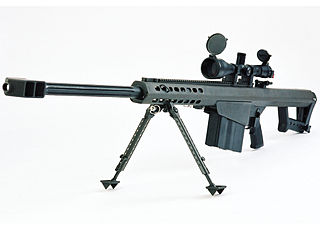
An anti-materiel rifle (AMR) is a rifle designed for use against military equipment, structures, and other hardware (materiel). Anti-materiel rifles are chambered in significantly larger calibers than conventional rifles and are employed to eliminate equipment such as engines and unarmored or lightly armored targets. While modern armored vehicles are resistant to anti-materiel rifles, the extended range and penetration still has many modern applications. While not intended for use against human targets, the bullet weight and velocity of anti-materiel rifles gives them exceptional long-range capability even when compared with designated sniper rifles. Anti-materiel rifles are made in both bolt-action as well as semi-automatic designs.

The M24 Sniper Weapon System (SWS) or M24 is the military and police version of the Remington Model 700 rifle, M24 being the model name assigned by the United States Army after adoption as their standard sniper rifle in 1988. The M24 is referred to as a "weapon system" because it consists of not only a rifle, but also a detachable telescopic sight and other accessories.
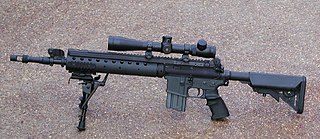
The United States Navy Mk 12 MOD 0/1/H Special Purpose Rifle (SPR) is a designated marksman rifle that was in service with United States Special Operations Forces in the designated marksman role until 2017, also designed to be shorter than standard weapons. SPR initially stood for Special Purpose Receiver as it referred to an add-on upper receiver assembly, but that nomenclature changed to Special Purpose Rifle as the weapon became a stand-alone weapons system.

The Barrett M82 is a recoil-operated, semi-automatic anti-materiel rifle developed by the American company Barrett Firearms Manufacturing.

The 6.8mm Remington Special Purpose Cartridge is a rimless bottlenecked intermediate rifle cartridge that was developed by Remington Arms in collaboration with members of the U.S. Army Marksmanship Unit and United States Special Operations Command to possibly replace the 5.56 NATO cartridge in short barreled rifles (SBR) and carbines. Based on the .30 Remington cartridge, it is midway between the 5.56×45mm NATO and 7.62×51mm NATO in bore diameter. It uses the same diameter bullet as the .270 Winchester hunting cartridge.

The OTs-14 Groza is a Russian selective fire bullpup assault rifle chambered for the 7.62×39 round and the 9×39mm subsonic round. It was developed in the 1990s at the TsKIB SOO in Tula, Russia.

An intermediate cartridge is a rifle/carbine cartridge that has significantly greater power than a pistol cartridge but still has a reduced muzzle energy compared to fully powered cartridges, and therefore is regarded as being "intermediate" between traditional rifle and handgun calibers.

The M6 is a series of carbines designed and manufactured by LWRC International. It is based on the M4 carbine, with which it shares 80% of its parts. The 'M' model name is not a US military designation. Like the HK416, it features a proprietary short-stroke self-regulating gas piston system and bolt carrier/carrier key design, which prevents trapped gases from contacting the bolt carrier or receiver of the weapon. The manufacturer claims that this reduces the heating and carbon fouling of the internals, simplifies field maintenance, and improves reliability.
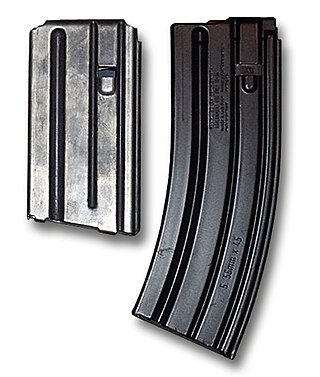
A STANAG magazine or NATO magazine is a type of detachable firearm magazine proposed by NATO in October 1980. Shortly after NATO's acceptance of the 5.56×45mm NATO rifle cartridge, Draft Standardization Agreement (STANAG) 4179 was proposed in order to allow NATO members to easily share rifle ammunition and magazines down to the individual soldier level. The U.S. M16 rifle's magazine proportions were proposed for standardization. Many NATO members, but not all, subsequently developed or purchased rifles with the ability to accept this type of magazine. However, the standard was never ratified and remains a "Draft STANAG".
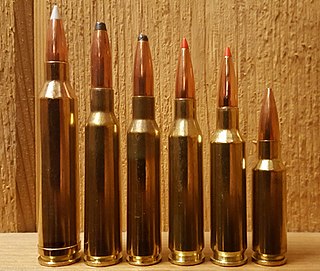
The 6.5mm Creedmoor (6.5×48 mm), designated 6.5 Creedmoor by SAAMI, 6.5 Creedmoor by the C.I.P. or 6.5 CM or 6.5 CRDMR for short, is a centerfire rifle cartridge introduced by Hornady in 2007. It was developed by Hornady senior ballistics scientist Dave Emary in partnership with Dennis DeMille, the vice-president of product development at Creedmoor Sports, hence the name. The cartridge is a necked-down modification of the .30 Thompson Center.

Polymer-cased ammunition (PCA) is firearm ammunition (cartridge) with casings made from synthetic polymer instead of the typical metallic casing. PCA is considered a new alternative that potentially reduces production cost and weight for long guns and handguns.

Lewis Machine and Tool Company (LMT) is an American armaments company founded by Karl Lewis, in 1980. LMT manufactures weapon systems including the M4 carbine and the M203 grenade launcher. LMT products are used by the military forces of the United Kingdom, New Zealand, Estonia, and the United States. LMT formerly produced forged FAL receivers for Illinois-based DS Arms.
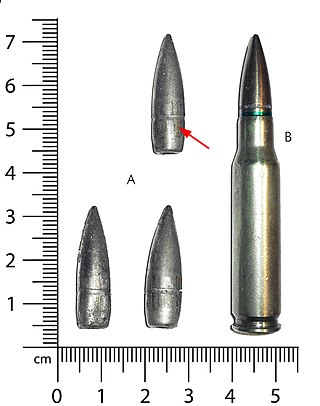
The 7.62×51mm NATO is a rimless, bottlenecked rifle cartridge. It is a standard for small arms among NATO countries.

LWRC International, LLC, formerly known as Land Warfare Resources Corporation, is a CAGE defense contractor and firearms manufacturer, founded in 1999, and is now based in Cambridge, Maryland.
The Colt Canada C20 DMR is a 7.62×51mm NATO designated marksman rifle created by Colt Canada, in response to a request by the Canadian Armed Forces to replace their earlier 5.56mm C8 carbine in sniper sections. The weapon is intended to enter service in the Canadian and Danish militaries, beginning in 2021. C20 rifles are fitted with the Schmidt & Bender 3-20×50 Ultra Short riflescope.

LWRC R.E.P.R. MKII is a semi-automatic rifle manufactured by LWRC International. It is chambered in either 7.62×51mm NATO or 6.5mm Creedmoor.

The XM7, previously known as the XM5, is the U.S. Army variant of the SIG MCX Spear, a 6.8×51mm, gas-operated, magazine-fed, assault rifle designed by SIG Sauer for the Next Generation Squad Weapon Program in 2022 to replace the M4 carbine. The XM7 features a free-floating reinforced M-LOK handguard for direct accessory attachment onto the "negative space" mounting points.
The SIG MCX-SPEAR is a multi-caliber rifle developed by the American division of SIG Sauer from the SIG MCX series of carbines. The SIG MCX-SPEAR is primarily chambered in .277 SIG FURY but can be adapted to 7.62×51mm NATO and 6.5mm Creedmoor with a barrel change.

















